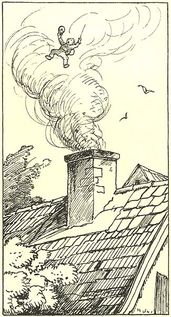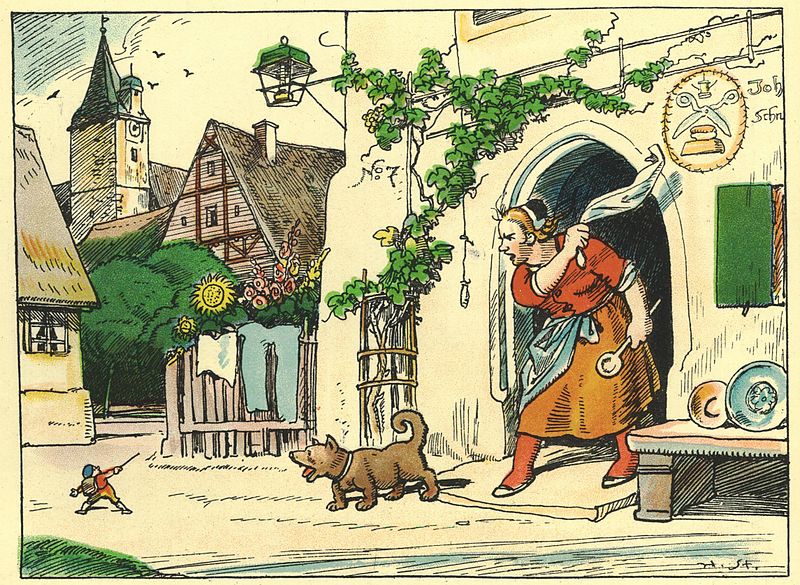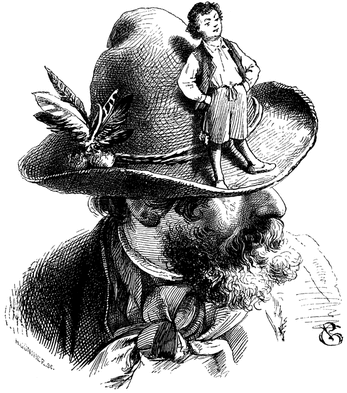|
The Grimms published two tales that were very similar: Thumbling (Daumesdick) and Thumbling's Travels (Daumerling's Wanderschaft). Although they're both commonly referred to as Thumbling, these are not the same character.  Thumbling begins his journey. Hermann Stockmann (1867-1938). Thumbling begins his journey. Hermann Stockmann (1867-1938). Thumbling's Travels, or Thumbling as Journeyman begins with Thumbling telling his father, a tailor, that he wants to go out into the world. He takes a darning needle for a sword. Before he can do anything else, he's blown up the chimney on the steam from a hot meal. When he lands, he goes to become a tailor's apprentice, but is displeased with the food. He mocks the cook, telling her, "I will go away, and early to-morrow morning I will write with chalk on the door of your house, 'Too many potatoes, too little meat! Farewell, Mr. Potato-King.'" She does not react well. Taking up his journey again, he joins a band of robbers and they rob the king's treasury. The impressed robbers want to make Thumbling their captain but he wants to see the world first. He goes on his way, taking only one kreuzer (a small silver coin) because it's all he can carry. He takes a job as a manservant at an inn, but snitches on the maids when they steal food. A vengeful maid catches Thumbling in the garden and gives him to the cows with the grass clippings, causing him to be swallowed. When someone milks the cow, Thumbling calls, "Strip, strap, strull, will the pail soon be full?" They slaughter the cow, and Thumbling is sealed into a black-pudding or sausage and hung up all winter. He only escapes when someone cuts it open. Once outside, he is swallowed by a fox, and promises to let it eat the chickens in his father's yard if it will take him home. This happens, and Thumbling is reunited with his overjoyed father, who doesn't mind the fox eating his chickens now that he has his son back. The end. The hero being a tailor suggests a connection to the story of the Brave Little Tailor. There are actually many songs and jokes about tailors being very small or thin. In Eucharius Eyering's Sprichwörter (1601), a tailor as light as elder-wood is blown into the air and gets caught in a spider's web. There is one folk song about a tailor falling into a soup bowl and being swallowed, and another about tailors feasting on a fried flea and drinking out of a thimble - for the second, see "Nine Tailors Held a Council" by William Davis Snodgrass. SurLaLune's annotation of the Brave Little Tailor explains, "tailors were poor and not highly regarded by society because they were seen as weak men." Because of the Industrial Revolution and the decline of guilds, tailors were poor and travelled around. Townspeople saw these wanderers as shifty, lazy and dishonest. As seen in this German list of idioms, there were sayings like "freezing like a tailor" for oversensitivity to cold, and "eating like a tailor" for not eating very much. The weakness of tailors was attributed to a lack of food and it was said they couldn't bear much in contrast to the strong appetite of the agricultural workers. The Schneider-Geiß-Spott or Schneider-Spottlied (tailor-mocking) was a specific type of German joke which originated as a crude sexual gag. These date back to at least 1408, when a Strasbourg council banned such a joke. The Grimms' tailors, however, are courageous, clever tricksters. Cleverness is the most esteemed virtue in Grimm tales. Thumbling is called a journeyman, meaning he's completed his apprenticeship but is not a master tailor. Like all the Grimms' stories, Thumbling's Travels changed in the telling. The first edition preserves the stories more exactly as they were first told. Later editions, after the stories became popular, soften unsavory elements and polish the plots. Wilhelm was the principal editor after their first edition, and revised the tales extensively to make them more dramatic and literary. In The 1810 Grimm Manuscripts, Oliver Loo compares the Grimms' first edition from 1812 with an earlier surviving draft. There are some small differences, mostly literary embellishments and polishing. The original edition lacked the "Farewell, Mr. Potato King" and indeed any mention of potatoes. Jacob and Wilhelm heard the potato line from a maid, completely separately from the tale, and Jacob called it a “handwerksspaß” (workers jest). Jacob did not seem entirely pleased with the inclusion of a joke foreign to the original story. (pp. 212-219). Some sources say the the source of Daumerling's Wanderschaft was Marie Hassenpflug, a frequent source of the Grimms', but in the index, the Grimms say that the story comes from "stories current in the districts of the Maine, Hesse, and Paderborn, which reciprocally complete each other." This implies they patched together quite a few stories, probably including Marie Hassenpflug's. They add, "a continuation or special combination of the detached stories, which belong to this group, contains the story of Thumbling (No. 37)" - that is, Daumesdick. Daumesdick is usually translated as Thumbling but might be better referred to as Thumbthick. It begins with a childless couple wishing for a baby, even if it's only the size of a thumb. The woman then falls pregnant and gives birth after seven months to a thumb-sized child.
Thumbthick never gets any larger, but is very clever. One day Thumbthick takes the horse and cart to his father who is cutting wood, and rides in the horse's ear, calling directions. Two men see the horse apparently by itself, and when they see Thumbthick, want to buy him so that they can exhibit him for money. Thumbthick tells his father to take their money, and goes off with the men, only to slip away from them. He then encounters two thieves and offers to help them rob the wealthy pastor. When they get to the pastor's house, however, Thumbthick makes such a racket that he wakes the people inside and the robbers flee. Thumbthick intends to head home, but is swallowed by the pastor's cow. He cries out, "Am I in the fulling mill?" (In a fulling mill, wool is beaten and boiled to make felt.) People hear him yelling inside the cow's stomach. The pastor, believing the animal is possessed, has it slaughtered. The stomach is thrown on the midden (trash heap), where a wolf eats it before Thumbthick can escape. Thumbthick tricks the wolf into going to his house, promising it a feast, and directs it to the larder of its house. It gorges itself so much it can't get back out, and Thumbling screams for his parents, who kill the wolf. Thumbthick is reunited with his family and says that he will never leave them again. This story was not in the first 1812 edition, and first appeared in the expanded and edited version in 1819. Thumbthick comes from Mühlheim on the Rhine, a town near Cologne. Although it is very similar to Daumerling's Wanderschaft, it has some strong variations and is closer to the most widespread Thumbling formula. It includes the wish for a child no matter how small. Thumbthick helps his father on the farm, drives a wagon or plow, sells himself and cheats the buyer, and frightens off robbers. You see these themes again and again, so perhaps it's fitting that it gets its own space in the Grimms' collection. The 1958 film "tom thumb" is an adaptation of this story. The scene with the men wanting to exhibit him is interesting, because it has a hint of the life a person with dwarfism might have led at that time, performing for the public. This shows a change from the older English story of Tom Thumb, where the main character is a court dwarf performing for royalty. I always used to imagine these two Grimm tales being connected, like Thumbthick somehow growing up to be Thumbling, but the two characters are very different. This is most clearly seen in their treatment of the robbers and of the fox/wolf. Thumbling works so well with the robbers that they want to make him their captain, and in the end the fox that swallows him is rewarded for taking him home. Thumbthick is more manipulative and opportunistic. He entices and then double-crosses the men who want to exhibit him, the thieves who want to use him, and the wolf that swallows him. Both Thumblings are tricksters, but one plays tricks on wealthy kings and dishonest maids, and the other plays tricks on robbers and beasts. FURTHER READING
Text copyright © Writing in Margins, All Rights Reserved
0 Comments
Leave a Reply. |
About
Researching folktales and fairies, with a focus on common tale types. Archives
July 2024
Categories
All
|
Writing in Margins


 RSS Feed
RSS Feed
